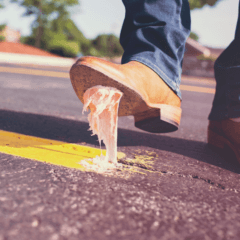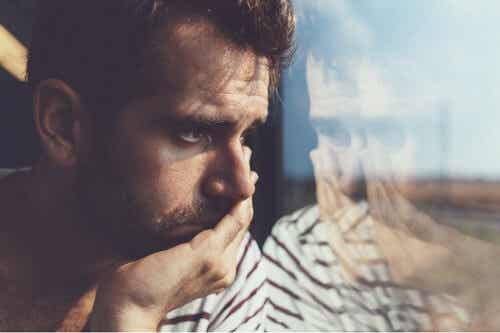When it seems that only chaos and uncertainty reign around us, having self-confidence becomes a great asset. In the face of world instability, it is important to gain inner calm, have confidence and adopt a resilient attitude. Fear loses strength only when we begin to rely on our resources and become more confident.

Written and verified by the psychologist GetPersonalGrowth.
Last update: 15 November 2021
When nothing seems certain, when you have the feeling that the ground is missing under your feet, self-confidence is essential. Nothing binds us to life more than the belief that we deserve better, that whatever happens we can always count on our strength to face the future. It is an extremely valuable psychological resource.
It could be argued that this dimension is, in a sense, directly linked to our ability to live a more satisfying and happy life. On the other hand, the counterpart to self-confidence is fear and, as we all know, nothing is as devastating as a day marked by anguish, insecurity and the feeling of not having control over anything.
Moreover, to this is added that in this period we are experiencing a crisis on various levels. We look to the future with a feeling of unease and uncertainty, with the thought that many of the things we have taken for granted up to now may be upset. Faced with such a scenario, we have only two options: to sink into the abyss of helplessness or to react with a flicker of revitalizing energy: trust.
Nothing and no one can guarantee us that tomorrow will be positive or negative. But learning to have self-confidence is essential to be able to face any adversity.
Trusting yourself to make (almost) everything possible
For Carl Rogers, founder of client-centered therapy and a leading exponent of humanistic psychology, self-confidence is an essential component of self-esteem. A priority dimension to which attention should be paid so that all people can achieve well-being.
Abraham Maslow also takes this into account in his theory of the hierarchy of human needs, represented by means of the well-known pyramid. Self-confidence is part of the phase of esteem or recognition.
In that area in which independence, self-esteem, dignity are also integrated, the feeling of being competent in completing an initiated task, to achieve goals, conquer spaces, love and be loved ... According to Maslow, it is only when we master these dynamics we are able to aspire to the heights of self-realization.
Self-confidence is somewhat the key that allows you to obtain those gratifications that life offers and that, at times, we let ourselves escape out of insecurity, fear or, even worse, because we think we don't deserve them. For this reason, it is good to take into account all the objectives that we could achieve thanks to this psychological competence.
In a chaotic world, learning to have self-confidence is essential
In a world of constant change, self-confidence can offer invaluable benefits:
- Feel less fear and lower levels of anxiety.
- Disempowering the inner dialogue, that voice that for a long time has convinced us that we are not capable, that we do not know how to do it or that we do not deserve something.
- Feeling more motivated to work and strive for get what you want.
- Develop better coping strategies to cope with difficulties.
- Have a more positive view of themselves.
- Improve the quality of relationships.
How to build better self-confidence?
If you want to change your life, if you want to improve your reality and face difficulties in the best possible way, start now: learn to trust yourself. However, don't forget that this is a task that requires constant work.
Self-confidence and self-esteem wear out very easily. They are not stable dimensions over time, it is not like sculpting a sculpture from a block of marble and admiring the work of art created for life.
On the other hand, it is a question of rather sensitive dimensions. Sometimes a disappointment, a mistake made and even a disastrous emotional relationship is enough to defuse those psychological forces on which so much time has been invested.
It is therefore necessary to remain alert and take care of yourself mentally and emotionally. Let's see some strategies that can prove useful in this regard:
- Clarify your values, your goals. Be aware of what is really important to you, what you want from life and what you expect.
- Accept that you are not perfect. You have every right to make mistakes, fail, suffer when fate is against you. However, it is your duty to get back on your feet and learn from it.
- Be compassionate with yourself, master your inner dialogue with kindness. Don't act like your own worst enemy, respect yourself.
- Reinterpret your fears. Whenever they convince you that they can't handle something, ask why. Reformulate them, eliminate them from your mind if they have no meaning or foundation.
- Set goals that are easy to achieve. This way you will feel more efficient, capable, strong and motivated.
- Don't allow anyone to limit your potential or question your abilities. You deserve what you want.
In times of crisis, believe in yourself
Learn to trust yourself. Awaken that force to act like a parachute when everything falls apart.
Trust yourself on days when nothing is certain and only the storm is on the horizon. Put in place the ingenuity, resilience, the capacity for action, the wisdom in managing fear and reacting to difficulties ...
When the whole world is in chaos, rely on that mental refuge where calm reigns and confidence grows. Because if the future is uncertain, the only sure thing is you; you and your determination to move forward, to help others, to aspire to the best. To feel good.


























